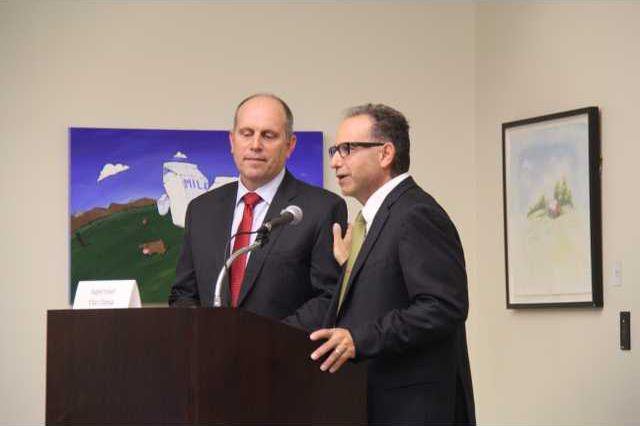The third annual Turlock Government Night drew in over a hundred community residents seeking answers to their questions on the state of local, state and federal issues.
While many audience members asked an abundance of questions relating to the workings of regional and national government, the two prevailing topics included questions regarding state water issues and job creation.
The panel of four included Mayor John Lazar, County Supervisor Vito Chiesa, Assemblymember Kristin Olsen, and Congressman Jeff Denham, all of whom did their best to inform their constituents of the various matters that they’re currently working on.
Taking place at California State University, Stanislaus, the evening began with a welcoming from CSU Stanislaus President Joseph Sheley, who has been working alongside the City of Turlock to form a mutually beneficial partnership over recent months. Emphasizing the importance of the university to the local community, Sheley applauded the public officials for taking the opportunity to connect with Turlock citizens on political issues affecting the region.
“Sometimes CSU Stanislaus is regarded as an island in Turlock,” said Sheley. “But tonight we’re not an island. Tonight you’re here as a community.”
Each of the four panelists took a moment to highlight the various legislation and public policy they’ve been prioritizing over the past year, while also examining the issues that they expect to see throughout the remainder of 2014.
On a local level, both Mayor Lazar and Supervisor Chiesa stressed regional transportation issues and the much-needed improvements facing the county’s infrastructure. Although both had hoped that the Stanislaus Council of Governments would have opted to place the proposed countywide transportation tax on the November ballot, they agreed that the issue would still need to be prioritized in the coming years.
“Turlock cannot wait any longer for transportation and roadway improvements,” said Lazar. “I’m sorry that StanCOG did not raise the opportunity to move forward with the transportation tax…Unless we get federal and state dollars, we’re not going to see the streets and roads in town improved. But the Council would like to have a dialogue this year to see if we can put a citywide tax on the November ballot.”
While Lazar and Chiesa both addressed regional water concerns, such as the Surface Water Treatment Plant that the City of Turlock has been working on for the past several years, Assemblymember Olsen and Congressman Denham also touched on the subject, noting the many impacts the current drought in California has on a national level.
“Water is a very critical issue right now,” said Denham. “The last time California saw a drought like this, there were cities that had a 60 percent unemployment rate because of its impacts. It drives down the economy of the entire region, and is much worse than the drought in 1976…We’re going to see continued challenges in the coming years, and while we need a short term fix to transfer water, both the Senate and House, Democrats and Republicans, need to come together to work with local and state governments to build long term solutions.”
While agreeing that California must make changes to its crumbling water system, Olsen noted that there were some positives surrounding water concerns, such as the City of Turlock being ahead of the curve with a list of projects in conjunction with the Turlock Irrigation District that are merely pending on approval. Olsen also talked extensively on desalinization plants in the Middle East, and the need for California and the Central Valley to begin exploring the development of their own plants to help avoid water crises in the future.
“There have been new opportunities to co-locate desalinization plants with power plants, where we could be reducing costs while keeping desalinization plants off the grid,” said Olsen. “We’re seeing a greater opportunity to make desalinization plants a cost effective opportunity in California.”
With many audience members taking the question and answer period of the forum to touch on unemployment rates and job creation, many inquiries came forward asking what each of the four lawmakers were doing to bolster economic recovery and job growth within the Central Valley.
Although Lazar noted the significant strides made in Turlock’s Regional Industrial Park and the hundreds of jobs that have been created through gaining new industrial users, Congressman Denham addressed the topic from a national perspective, saying that many laws in California have made business owners move their companies to other states where less restrictive laws make it easier, and more cost effective, to do business.
“We need to have states in competition, and have states pass their own laws to help create that competition,” said Denham. “But do I like the fact that California jobs are going to Texas? Hell no. I have friends moving there, and know of many local companies that have moved there, but businesses are going to do what they have to in order to survive. That’s why we need to make sure that we make improvements to our laws, to our water system and infrastructure, to make California an attractive place to do business.”
Other topics addressed by the panel included education and Common Core Standards, the ongoing conflict between the Ukraine and Russia, improving veterans affairs, immigration reform, bringing the ACE train to the Central Valley, and more.
The evening concluded with the Lazar, Denham and Olsen thanking Chiesa for putting together the third annual event, and all four panelists spending one-on-one time with audience members following the open forum.





